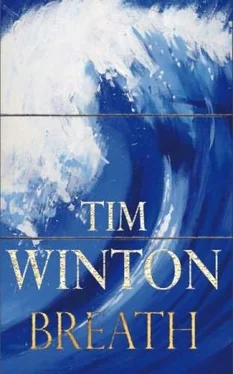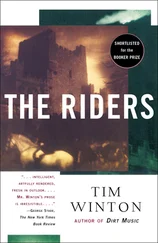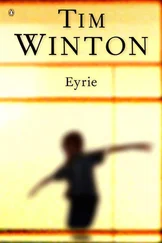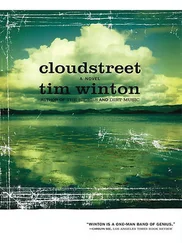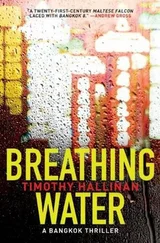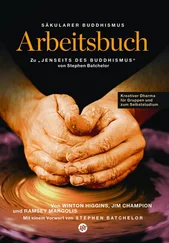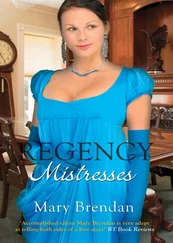That summer Loonie and I surfed until we were sun-cooked, until our arms gave out and the foam chafed our bellies raw. At night my mother dabbed Flavine on the stippled scabs on my chest and sponged vinegar down my sunburnt back. There was no hiding from her what I was doing but she said nothing about it. Whenever the old man found my Coolite propped on its end in his shed he tossed it out into the weeds without a word. I still helped him pluck poultry and turn dirt for the vegetable garden but we didn't fish much together anymore and I knew that he felt forsaken. I'd moved on from him, we both knew it, and try as he might he couldn't hide how much it hurt. He never mentioned the older boys who dropped me at the end of the drive some afternoons. I half expected him to interrogate me about them, but he seemed resigned. He'd always looked old but now he seemed fearful and disappointed. I was only going surfing, but to see his face you'd think I'd left home already.
In the new year Loonie moved across to the Ag School. It was the only junior high in the district and if you wanted to go on and finish the final two years you had to board in Angelus or take the dawn bus every day. That year, during school hours, Loonie and I began to live in slightly different worlds. By his account Ag School was strange and tough. In those days it was boys only and you learnt about wool and crops and insemination. There were fights out by the machinery shed nearly every Friday, and some evenings when he dropped by Loonie had bruises and scrapes all over him. He never backed away from anything or anyone; that was just how he was. He talked about kids who shaved, who had arms like Christmas hams, older blokes who said his mother was a slut, which was why he fought them. I was still a bit vague about what a slut actually was and I was confused about whether the references were aimed at his mother or his stepmother, so I didn't press him for clarification. In July, when Mrs Loon packed up and shot through in the middle of the night, Loonie seemed unmoved. I'd hardly known her. I remember a squat little woman with dark, curly hair and a gold tooth. He never spoke about her again.
Some winter weekends we rode out to the rivermouth with our Coolites, but often as not the swell was so big we never got beyond the thumping shorebreak and over at the Point the rip looked treacherous. Chastened by our failure Loonie and I would towel off and get dressed and scuttle out along the rocks to watch the Angelus crew confront the great, heaving waves that pivoted past the headland to spew into the bay. They sat way outside of where anybody normally surfed, so far off that their silhouettes were only intermittently visible. For long periods nobody did much out there but bob about, scratching seaward every few minutes to avoid the looming sets that threatened to bury them. In such a swell the rocks along the Point were awash so high up that we were forced back into the scrub to stay safe and dry. We hunkered down in our lookout, pulled our coats about ourselves and willed somebody to take off, until eventually one of the Angelus crew would turn and start to paddle. Some of the waves were as high as us in our nest on the headland. Whenever somebody sucked up the courage to go we were beside ourselves; we screamed and hooted for him as he clawed his way over the edge and we groaned and seized our hair when he came unstuck. There'd be a horrible ball of foam, a snarl of limbs, and a board shooting skyward to flip like a tossed penny above the carnage while we searched the water for a head or an upstretched hand. Thrilled and appalled, we could sit there for hours. It was our coliseum.
One surfer seemed to show up on only the very biggest days. He was quite an old guy and his board was so long and thick that he'd carry the thing on his head down through the peppermint scrub to the beach. Then he'd jog to the water and launch himself into the crunching shorebreak and aim straight for the rip, paddling on his knees, always as casual as you like, whatever the conditions. You'd barely see him for half an hour and then a set would break out wide, like a squall rolling into the bay, and you'd suddenly pick out the white squirt of a wake on the grey-brown crags of a wave big and ugly enough to make you shiver. There he would be, that tiny figure, strangely upright and nonchalant, rising and swooping until he was close enough to be more than just a silhouette. His skill was extraordinary. There was something special about his insouciance and the princely manner in which he cross-stepped along his long, old-timey board, how he stalled and feinted and then surged in spurts of acceleration across the shoaling banks, barely ahead of the growling beast at his back, and when the wave fattened toward the deep channel in the middle of the bay, he'd stand at the very tip of the board with his spine arched and his head thrown back as if he'd just finished singing an anthem that nobody else could hear. Neither of us knew who this man was. We reckoned he must be from the city, but when Loonie piped up to ask the Angelus crew about him, they just grinned and ruffled his taffy hair, which made him so mad I had to drag him away before he started a fight I didn't want to be in.
When it was too stormy and vile to go out to the coast, Loonie and I stayed in town and entertained ourselves at the river, paddling bits of junk from bank to bank, leaping from trees, swinging on ropes. We had lungs like camel bladders by then; we sledged each
other mercilessly, each daring the other to break the two-minute limit beneath the diving board. In the summer sea when it was flat-calm and there was nothing else to do but dive down and lie on the clean, ribbed bottom and hold our breaths to count Mississippis we got pretty close to our goal. But trying it at the bottom of the river in winter was another challenge altogether. It was a grim business down there in the dark, clinging to the saurian roots of rivergums, so cold that a minute's worth had us surfacing blue-lipped and dizzy. We climbed up onto the bank too numb and stunned to even feel the fire we'd left burning to warm ourselves by.
Loonie's old man found us shivering like that one drizzling Sunday afternoon in July.
Look at youse two stupid pricks, he muttered. It's rainin and the water's as cold as a witch's bits and you're bloody swimming.
We like swimming, said Loonie without even looking up.
Karl Loon had his flying jacket on, all leather and sheepfleece. Loonie said he'd been in the air force, though from what I could hear of his old man's faint accent it wasn't necessarily the kind of outfit that flew in English. Mr Loon was a big, square bloke with a boxy head. He might have been Polish once or maybe a Croat — you'd have to listen hard to hear it. The wool of his coat collar was as yellow as a nicotine stain. His hair was oiled and parted on the side and even though this was the first time I'd ever seen him in the outdoors, he always looked sunburnt.
And now you burnin green wood, he said. No wonder youse can't get warm.
We're orright, said Loonie sullenly.
Chop me some wood for the pub and I'll let youse have some for here. What d'you reckon? I got five ton in just now and no one to split it.
Loonie hugged himself and shook his head.
Youse got something better to do?
We'll do it for money, said Loonie.
How much?
Ten bucks a ton.
His old man laughed.
Each! said Loonie.
You can git to buggery, said the publican, walking away.
But it turned out that we did split the wood, and we did the job for a fiver a ton each. We chopped in the rain for days out in the long yard behind the Riverside, amidst a wasteland of weeds and lines of washing, broken sofas and stone troughs. An old fella with a humpback and a drooping fag sat and watched us from beside the glittering ranks of empties as we split those sappy mill-ends and sucked at our splinters and stacked the cut wood in the lean-to by the pub laundry. Before we'd even finished our five tons we had offers of similar work all over town. Drinkers either took pity on us, or saw us as a means of getting the missus off their backs, but any way you looked at it, we were in business.
Читать дальше
